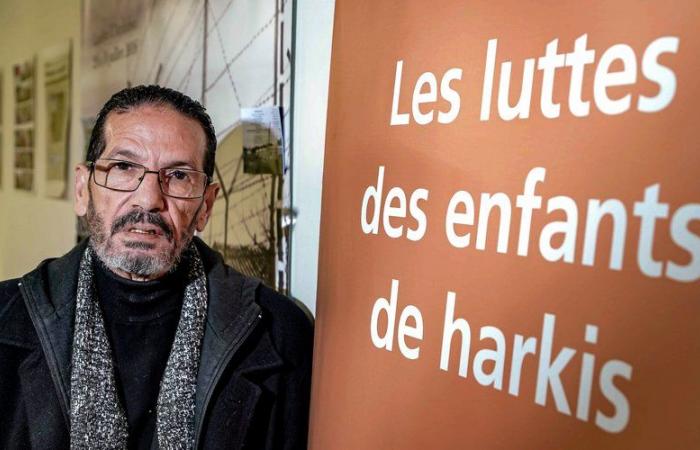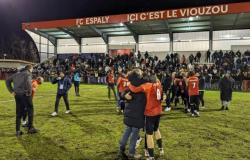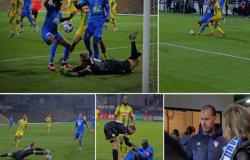
In 2022, this skinned alive, unwavering activist for the Harkie cause, made a promise to his mother who was then on her deathbed. But the remains of this baby who died of cold in the Harki camps of Rivesaltes, where he had been interned by France with his family during the decolonization of Algeria, have, like dozens of other bodies of children, all simply disappeared.
Certain encounters can mark a professional career. For the author of these lines, the meeting with Hacène Arfi this Saturday, December 21, 2024 is one of them. It was in Saint-Laurent-des-Arbres, in Gard, that the president of the harka coordination – an association bringing together harkis and their loved ones since 1996 under the sign of solidarity and mutual aid – ended up finding refuge .
In the premises of his association, where vestiges and press articles are piled up on his fight for the recognition of the rights and the protection of harkis, the moving sixty-year-old willingly agrees to discuss, that morning, one of his many injuries. An injury rekindled precisely on December 10, during a meeting organized in the salons of the Pyrénées-Orientales prefecture.
Remains of a cemetery
“At that time, I was still desperately searching for many years for the body of my young brother. A baby to whom my mother had given birth in a tent one winter evening, in the freezing cold, and who had died a few hours after his birth. birth It was in November 1962. We arrived from Algeria and had been interned there by France, at the Joffre camp in Rivesaltes.painfully remembers the one who had then attended, at the age of five, the burial of this infant inside the camp and by his own father. “Tenderly, he took care to wrap it in a small towel. Because we had nothing more.”details the man, overwhelmed by emotion.
In a calm and slow voice, Hacène Arfi then evokes this promise made in 2022 to his mother, on the day of her death, to find this little brother's body at all costs.
A promise which, last November, was about to be honored, while archaeologists announced that they had discovered, during excavations on this “transit and reclassification” camp of the Harkie population, the remains of a children's cemetery materialized by the presence of small tombs and funerary plaques.
Makeshift burials that could correspond to those of these dozens of young children and infants, who died of hunger and cold in this other death camp, according to countless corroborating testimonies from relatives of children who died between 1962 and 1965 at the Rivesaltes camp.
Empty graves
“In this context, it is obviously full of hope that I went at the beginning of December with other harkie families from Gard to Perpignan at the invitation of the prefecture. And it is accompanied by all these relatives of dead children during their internment at Rivesaltes, that I received a real blow there!says Hacène Arfi.
In front of these dozens of searching families, the secretary general of the prefecture announces that the graves discovered a month earlier are simply… empty. “Only two bones were ultimately discovered in this cemetery”continued, still in front of the families, the INRAP archaeologists1 having carried out the excavations and also present at this meeting of horror.
“Where are the bodies of the children? Where could that of my little brother be? Where and why were they moved”Hacène Arfi, full of pain, was still wondering this cold Saturday morning of December 21. To these multiple questions, the man claims to have received no valid answer. Neither from the Rivesaltes town hall, nor even from the prefecture.
“These unjustified burials and transfers of bodies, moreover in an unknown location and carried out without authorization or even information from the families, were necessarily decided by the authorities. Their decisions, both scandalous and illegal, are upsetting dozens of families.”denounces the one who will join, if necessary in order to know the truth, the legal fight about to be initiated by a harkie family from the Alpes-Maritimes.
Marked, worn, traumatized by the war, the exile, but also by his internment in a camp where he experienced, among other horrors, the death of a little brother, Hacène Arfi, 67 years old, is now embarking on this which he describes as the last – but also one of the most important – battles of his life: to do everything before dying, to honor this last promise he made to his mother.
The promise to offer this brother, whom he only knew for a few hours, a dignified burial. Just like what every human being deserves, whether Harki or not.





